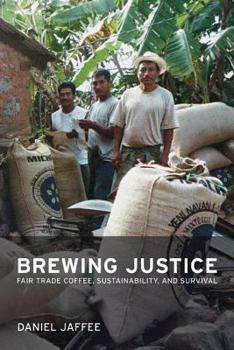Brewing Justice: Fair Trade Coffee, Sustainability, and Survival
Select Format
Select Condition 
Book Overview
Fair trade is a fast-growing alternative market intended to bring better prices and greater social justice to small farmers around the world. But what does a fair-trade label signify? This vivid study... This description may be from another edition of this product.
Format:Paperback
Language:English
ISBN:0520249593
ISBN13:9780520249592
Release Date:April 2007
Publisher:Perseus - Ucal Pod
Length:352 Pages
Weight:1.20 lbs.
Dimensions:0.9" x 6.1" x 9.0"
Customer Reviews
4 ratings
Life in the Mountains of Central America
Published by Thriftbooks.com User , 14 years ago
Daniel Jaffee's book is about much more than coffee. It is a detailed look into the lives of people living in the mountains of southern Mexico. I have been involved with a village in the mountains of Nicaragua for 3 years where the people also grow coffee along with staple food crops. Mr. Jaffee gets all of the details right and adds a myriad more. It is worth digging into his statistics, they truly help understanding the situation, the people, and their lives. Little can compare with the impact of 29% and 42% on page 170 (the percentage of people in two categories who do not always have adequate food for their children). He does not overdo it though, and gives the social impacts of the economic situations both locally and world-wide that drive these peoples' lives. The free vs. fair trade discussion will make anyone think. The book starts down a path of pushing fair trade over free trade but the more I read and digested the situation the more I tended back to free trade. It is a rare book that can so tie the chain of economic events from a poor farmer in Oaxaca to my morning cup of coffee. But even more so, I start to see many ways that we shape the world and even more where there is a shape I have no control over. In the end, I will buy certified organic fair-trade coffee and support free trade in the Americas. Life is complicated. Few books have taught me so much.
Coffee for Justice
Published by Thriftbooks.com User , 16 years ago
This is a stunning book. Written by a sociologist, it combines the best of anthropology, sociology, and economics to produce a work that transcends all of them and makes major contributions to the literature on social justice and on development. The core of it is a detailed study of the fall of coffee prices and the consequent rise of fair trade coffee-buying in Oaxaca, Mexico. Oaxaca was an ideal choice because it is an impoverished area that produces very good coffee, and because Mexico was particularly hard hit by the world meltdown in coffee prices in the 1990s. Oaxaca can now claim that much of its coffee is fair trade, organic, and shade grown, to say nothing of being a fine drink. Thus it can command a relatively good price that keeps the small producers there alive--barely. Jaffee not only describes the coffee economy; he shows, from a wonderful village study, how it relates to maize agriculture, labor out-migration, forest conservation, and other important aspects of life. The shade-grown coffee plantations of south Mexico are incredible wildlife paradises--a birdwatcher's mad dream of heaven--and are absolutely critical not only for the survival of Mexican birds but of migrants from the rest of North America as well. Jaffee seems not to know just how bad Mexican coffee was in the old days of state control of the coffee economy. The state saw fit, in many cases, to push mass production of low-grade coffee, trying to compete with Brazil. This failed. The free market came and wrecked the economy, but it did what competition is supposed to do: it improved the coffee, and provided better markets for what was already good. It also had the sad effect of driving many producers of low-grade coffee out of the field and into dire poverty. This problem remains with us. Somewhat more important is Jaffee's stress on the more general problems of the "free market" economy and "neoliberalism." He blames this for the worldwide woes of commodity production. I do not read the evidence quite the same way. As he points out, the world coffee trade is really dominated by five huge multinational firms (like Nestle) and a few more smallish ones (like Starbucks). These firms are supported by various direct and indirect subsidies, and get various other special favors. An oligopoly, especially when maintained by government action to some extent, is not a free market! He also shows that the dominance of First World buyers over Third World producers of coffee and other commodities has been maintained by war, subversion, and other ugly procedures that are the absolute antithesis of the free market. The fact is--as most Third World countries and a few First World scholars (like Aihwa Ong) now realize--that the world under "neoliberalism" has, if anything, even more neocolonial governmental control and manipulation than before. First World interests have forced their idea of "free markets" on the poor nations, but have kept the subsidies for their
Coffee and Trade
Published by Thriftbooks.com User , 16 years ago
This book is a fine-tuned look at Fair Trade in the coffee industry and very important for understanding the complex nature of growing coffee. The book is great.
Great overview of fair trade coffee
Published by Thriftbooks.com User , 16 years ago
Jaffee did a great job covering the important aspects of fair trade coffee. He thoroughly explained the history of the market and explained the coffee market during the ICA years as well. He also covers the drawbacks of fair trade. I would recomend this book to anyone interested in coffee as well as anyone interested in social justice.





